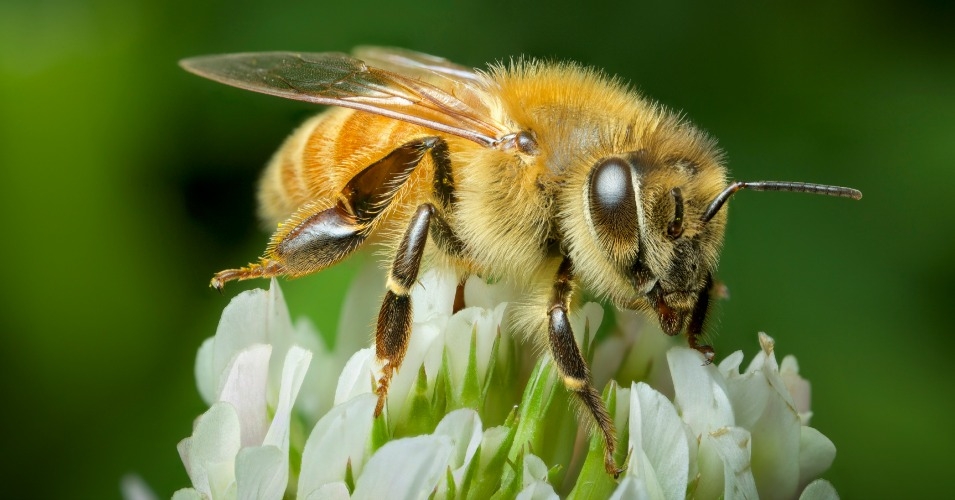They speak for the bees.
In a letter destined for President Obama on Thursday, eleven of the nation’s top environmental and public health advocacy groups, representing millions of Americans, are demanding the administration take much stronger and swifter action to end the perilous situation of the nation’s most prolific pollinators, most prominently the honey bee, caused by the widespread use of neonicotinoids, a dangerous class of pesticide.
The letter (pdf) calls on Obama to instruct the Environmental Protection Agency to immediately suspend neonicotinoid use and take retroactive and proactive steps to curb their adverse impacts.
“Bees and other pollinators are essential to our nation’s food supply, farming system, economy, and environment,” the letter states, “but they are in great peril and populations are dwindling worldwide. A growing body of scientif ic evidence points to the widespread and indiscriminate use of a class of neurotoxic pesticides called neonicotinoids (‘neonics’) as a key factor in bee die – offs .”
Specifically, the groups charge that although Obama appointed a special inter-agency panel, called the Pollinator Health Task Force, to study pollinator health last year, that effort is simply moving too slowly and time is running out. Mandated to assess the crisis of bee die-offse and offer recommendations after 180 days, the Task Force missed their deadline and have now indicated their report may not arrive until 2016.
“If current rates of bee die-offs continue,” the letter says, “it is unlikely that the beekeeping industry will survive EPA’s delayed timeline, putting our agricultural industry and our food supply at serious risk.”
Neonicotinoids, which are often applied to seeds before planting, are particularly harmful to bees because they poison the entire plant, including the nectar and pollen which bees eat. At elevated doses, neonics can kill bees directly, but scientists have found that at lower, more common levels of exposure the pesticides are negatively affecting bees’ ability to breed, forage, fight disease and survive winter months. What’s additionally troubling, according to neonic opponents, is how a recent EPA analysis found that neonicotinoid treatment on soybean seeds, one of the world’s premiere monocrops, offers little or no economic benefit to soy farmers.
In a letter to the Task Force sent in Novemeber of last year, over 100 scientists and urged immediate action on the bee-harming pesticides. “The President’s Task Force should listen to the body of science that links pesticides to bee harm and bee declines,” stated Jim Frazier, PhD, an emeritus entomology professor at Pennsylvania State University and commercial beekeeper advisor who specializes in chemical ecology, who signed a joint letter from the scientists.
In addition to action on neonics, Thursday’s letter also urges the Obama administration to close a legal loophole which allow further sale of other insecticides before they are adequately assessed for safety.
According to the groups—which include Friends of the Earth, NRDC, Greenpeace USA, Green for All, Earthjustice, Physicians for Social Responsibility, and five others—the science is in agreement and the stakes could not be higher:
Various stakeholders are taking steps to restrict the use of neonicotinoids , because the science is clear that pesticides are a leading driver of bee declines and are harming many other important and beneficial organisms, including birds, bats, butterflies, dragonflies, lacewings, ladybugs, earthworms, small mammals, amphibians, aquatic insects and soil microbes — putting food production and the environment in jeopardy. 4 Earlier this year, a global body of twenty – nine independent scientists – the Task Force on Systemic Pesticides – reviewed more than 800 peer-reviewed studies published in the last five years, including industry-sponsored studies, and called for immediate regulatory action to restrict neonicotinoids.
The letter comes three weeks after over 100 businesses, many of which are members of the American Sustainable Business Council and the Green America Business Network, sent a similar plea (pdf) to the president urging action on pesticide use and pollinator protections.
Representing companies from a variety of sectors and industries, the business leaders said they were “gravely concerned that if neonicotinoids continue to be allowed into our environment at current rates, this practice will have devastating impacts on our food, ecosystems, and economic wellbeing.”



